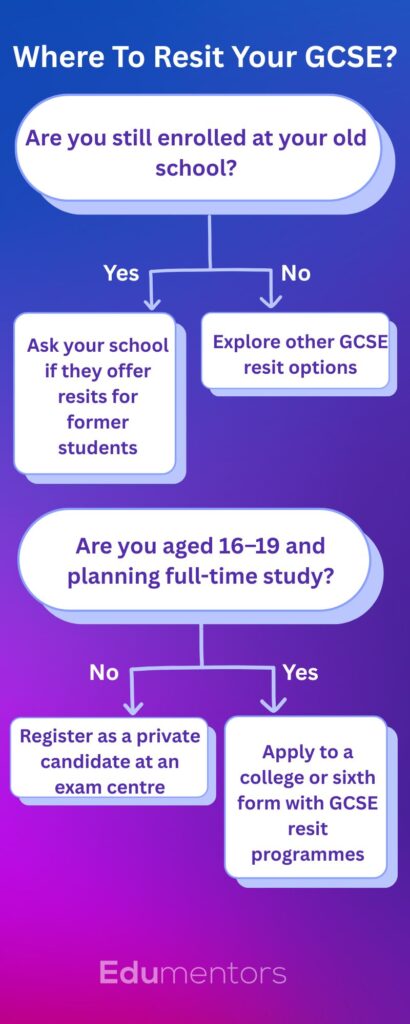Yes, you can retake GCSE If you didn’t get the desired grades, don’t worry, GCSE resits give you another chance. Whether it’s English, Maths, or a different subject, resitting GCSE allows you to get better results and keep progressing. This guide explains who needs to retake the exam, how this process works, key dates and available options.
When Can You Retake Your GCSEs?
There are two main exam periods for retaking your GCSEs each year: November and May/June. The right time depends on the subject and your prior performance. You can resit English Language and Maths in November, while all subjects are provided during the summer sessions. Each has specific rules, deadlines, and advantages, which we explore in the following paragraphs.
November Resits for English and Maths
In November you can only retake GCSE English Language and Maths, if you are 16 or older and got lower than grade 4. Both subjects are required for most college courses, apprenticeships, and job positions.
Students sit the same papers as the summer exams, and registration closes in early October. Students who already scored a grade 4 or higher are not able to resit the exam.
Summer Exam Period Options
During the May/June exam period students can resit any GCSE subject, including English and Maths. With more time for revision, usually grades get better.
Final marks are released in August, which might set you back from making college or job decisions. Registration ends in mid-February, with late entries accepted until April for an additional charge. We recommend you to register early to avoid extra costs.
Deadlines You Need to Know
Missing deadlines can impact your future plans, so here’s a timeline of the GCSE resit 2025 dates. Don’t forget to double-check the information with your exam centre, as dates might vary across each exam board.
GCSE Resit Deadlines: Full Overview
| Deadline | Summer Resits (All Subjects) | November Resits (English & Maths Only) |
| Standard Registration Closes | 13 February 2025 | 3 October 2025 |
| Access Arrangements Deadline | 21 March 2025 | 11 October 2025 |
| Late Entry Deadline | 17 April 2025 | 18 October 2025 |
| Exam Period Begins | 9 May 2025 | 3 November 2025 |
| Exam Period Ends | 18 June 2025 | 11 November 2025 |
| Results Day | 21 August 2025 | 15 January 2026 |
| Review of Marking Deadline | 19 September 2025 | 13 February 2026 |
Where Can You Resit Your GCSEs?
You can do GCSE resits through your former school, a college or sixth form, a private exam centre, or an online provider. Each option varies in terms of cost, level of support, and eligibility. Choosing the right path depends on your age, learning style, and budget.
Through Your Former School
Some schools allow former students to retake GCSE exams on-site, but with limited availability and teaching support. You need to contanct your school in advance. In addition to the exam costs, you may be charged an admin fee. Since the policies differ, it’s better to clarify the details directly.
At Colleges and Sixth Forms
Colleges and sixth forms usually provide GCSE resit programmes for students aged 16–19, especially for English and Maths. Mostly they are free and include full-time study plans. Also some institutions offer part-time or evening classes, with financial support available for eligible learners.
Via Private Examination Centers
At Private exam centres anyone can register as an external candidate. With more flexible options, costs are higher, typically £150–£300 per subject. This is a perfect choice for independent learners but may not be the best for coursework-based subjects, which require practical arrangements.
Through Online Providers with Exam Center Partnerships
Online providers offer full resit packages, which combine virtual learning and exam registration. It’s ideal for those who prefer self-paced learning. This flexible option is suitable for adults or anyone with other commitments. As,quality varies, only contact accredited providers with good reviews and high pass rates.

How Much Do GCSE Resits Cost?
GCSE resit costs differ based on the provider and subject choice.
Comparison of GCSE Resit Fees by Exam Board
| Exam Board | English / Maths | Science / Humanities | Subjects with Practical Work |
| AQA | £42–£47 | £47–£53 | £47–£53 £85–£100+ |
| Edexcel | £40–£45 | £45–£52 | £90+ |
| OCR | £44–£49 | £49–£55 | £95+ |
| WJEC | £43–£48 | £48–£54 | £80–£95 |
Private centres often charge £150–£300 per subject, including admin fees. Late entries can cost 30–100% more. So, make sure to register early.
Hidden Costs to Budget For
Consider planning ahead to reduce some of these costs.
- GCSE revision guides and study books
- Private tutoring sessions (£20–£50/hour)
- Past papers and online resources
- Travel expenses to exam centres
- Art/design materials or science practical fees
- Post-results services like remarking (£30–£50 per paper)
Financial Support Schemes Available
Students aged 16–19 may qualify for the 16–19 Bursary Fund through their college or sixth form. If you are over 19, you might get support from the Adult Education Budget, which is often available for a first GCSE pass in English or Maths. Some local charities also offer grants to help you cover exam or revision material costs. Your learning provider can guide you through these options.
Cost Comparison of Different Routes
| Route | Typical Total Cost (Per Subject) | Support Level |
| School (if eligible) | Free to £30 | Low to moderate |
| College/Sixth Form | Free (for 16–19s) | High |
| Private Exam Centre | £150–£300+ | None |
| Online Course + Centre | £300–£500+ | High (online only) |
While private routes are more expensive, they offer flexibility. For most students, colleges are the most beneficial, with built-in support.
Which GCSEs Should You Prioritise Retaking?
You don’t need to resit every subject. This decision should depend on your future goals, current grades, and realistic potential for career advancement.
GCSE Subject Content: Core vs Optional
English and Maths are necessary. If you received below grade 4, usually you are required to retake them for further education. Both subjects are also entry requirements for many job positions, apprenticeships, and higher education pathways.
However, don’t forget optional subjects. If your career or course depends on a specific GCSE, like Science for nursing, resitting it may still be important. Schools use Progress 8 and Attainment 8 systems that consider a range of subjects, which can later influence the recommendations you receive.
Impact on Further Education Choices
Many A-level courses have specific requirements GCSE grades. For example, For A-level Maths typically you need minimum a grade 6 in GCSE Maths, while Science A-levels often require grades 6–6 in Combined Science. For vocational courses like BTECs or T-levels, admission standards differ but may still include passes in English or Maths. Your educational journey might include challenges at different stages, and knowing what to do if you fail your A-levels is just as important as understanding GCSE or A-level resit options.
Strategic Selection Based on Career Goals
Your career plan should guide your decisions about Gcse resits. For example:
- Medicine: High grades in Maths, Science, and English
- Engineering: Strong Maths and Physics
- Teaching: Minimum grade 4 in English and Maths is mandatory
- Law or Journalism: English Language is often valued
Subjects like Geography, History, and a language can act as facilitating subjects, keeping more options open for later study.
Maximum Grade Potential Assessment
You need to be realistic. Improving from a grade 3 to a 4 is absolutely possible with the right support. But moving from grade 2 to 7 is extremely difficult, though not impossible.
Consider how much time you have left before the resit and how well you understand the subject. A teacher can help you focus on your weak areas.
What Are the Special Rules for English and Maths Resits?
English and Maths GCSEs have specific resit rules due to their importance in further education, employment, and government funding policies.
Post-16 Education Requirements
In England, students aged 16 to 18 must continue studying English and Maths if they failed to get at least a grade 4. This is part of the government’s policy of funding for further education providers.
Those with a grade 3 must resit the GCSE. If the grade is below 3, students may be allowed to take Functional Skills qualifications instead. Colleges and sixth forms must follow these rules to maintain funding.
Funding Options for Mandatory Resits
English and Maths GCSE resits are usually free for 16–19-year-olds, as they are part of funded full-time study programmes. Colleges also receive extra financial support for students with low prior accomplishement.
Students over 19 may be eligible for fully funded resits through the Adult Education Budget, especially if they haven’t yet got at least grade 4.
Alternative Qualifications That Count
Some students may take Functional Skills Level 1 or 2 instead of resitting GCSEs. These are accepted in many job positions and training pathways but may not be accepted by universities or competitive courses.
International GCSEs (IGCSEs) have global recognition but might not satisfy funding standards in state colleges. We advise you to confirm these requirements with your college or future course provider.
GCSE Resits: Progress Grade Requirements
Even if students fail their GCSE resits, they are still able to make progress. Colleges track the small improvements between attempts, and some students may need to resit gcses again if progress isn’t enough. Showing effort, even without reaching grade 4, can help providers adapt study plans and offer additional support.

How Should You Prepare for GCSE Resits?
Preparing for GCSE resits require a special approach. Instead of repeating what you did before, focus on identifying what went wrong and how to fix it.
Analysing Your Previous Exam Performance
Start by reviewing your last exam experience. Think about whether your struggle was due to limited knowledge, exam technique, poor time management, or anxiety.
Ask yourself:
- Which topics did I find difficult?
- Did I leave questions blank or run out of time?
- Did I understand what each question was really asking?
If possible, request copies of your marked papers. You can review them with a teacher later. Also look at examiner reports to learn about common mistakes and how to avoid them.
Targeted Study Strategies That Work
Focus on your weakest topics first and follow a consistent study routine. Use spaced repetition to review over time and practise gcse past papers. Use timed writing for essay subjects and regular problem-solving for Maths and Science.
Are There Different Rules for Adult GCSE Resitters?
Adult learners have more flexibility with GCSE resits. There are no upper age limits, and many providers offer personalised support for adults balancing study with work or personal life.
Flexible Study Options for Working Adults
Adults can take evening classes, weekend courses, distance learning, or blended learning. Adult education colleges often provide GCSE courses with flexible timetables. Some offer one-year or shorter intensive options.
Equivalent Qualifications Worth Considering
Depending on your goals, GCSE alternatives like Functional Skills Level 2, Access to Higher Education courses, or foundation years may be beneficial. These qualifications are often accepted for job applications, apprenticeships, and some college courses.
Although, certain careers or universities still require actual GCSEs, especially in English and Maths. Always check the specific requirements of your chosen path before deciding.
Support Systems Specifically for Adult Learners
Sometimes colleges offer mature student advisers, digital skills workshops, and study technique assistance. You may also be eligible for adult education funding or childcare support. Organisations such as the Workers’ Educational Association (WEA) provide additional resources and guidance for adults returning to study.
Accelerated Routes to Qualification
Some providers offer intensive GCSE courses that last a single term or semester. Others allow year-round self-paced study with exam-only entry. This is perfect for motivated learners who want to progress quickly. Taking fewer subjects at a time can also help you stay focused without becoming overwhelmed.
How Do Universities View GCSE Resits?
Most universities evaluate your final grades rather than how many attempts it took to achieve them. However, some courses and institutions may look more closely at your GCSE resit history, especially for competitive programmes.
Impact on Competitive University Applications
GCSE resits may be seen less favourably for highly selective courses like medicine or dentistry, especially after multiple attempts. But, many universities consider the full context. If your final grades meet the entry requirements, they are usually accepted.
Universities with contextual admissions often view resits more positively, especially if they show strong determination. While UCAS applications include qualification dates, most universities do not penalise resits unless clearly stated.
Subject-Specific Considerations
Resits in core subjects for your chosen course may be examined more closely. For example, medicine usually requires higher grades in Science, Maths, and English. Teaching courses often demand minimum a grade 4 in English and Maths. Some science and engineering degrees also focus on your Maths GCSE performance.
How to Address GCSE Resits in Personal Statements
While discussing resits, you can always present them as a sign of growth. Describe your determination, how you improved, and what you have learned from that experience. Never blame others or make excuses. Be honest and keep the tone positive.
For example:
“After not achieving my target grade in my first attempt, I focused on my revision methods and sought support to better understand key topics. The experience taught me the value of hard work and persistence.”
Alternative Entry Routes if Grades Remain an Issue
If your grades still don’t meet entry criteria, don’t worry, there are still other ways. Consider applying for a foundation year, an Access to Higher Education course, or a BTEC. Some universities are more flexible with resit candidates and accept a broader range of qualifications.
You can also gain relevant work experience and apply later as a mature student. What matters most is showing you are capable of succeeding in higher education.
What Are Your Next Steps After GCSE Resits?
Whatever your result, retaking a GCSE shows determination. Whether you reached your goal or not, there’s always an alternative way to keep moving towards your goals.
Converting Improved Grades into Opportunities
If your resit went well, your improved grades could open new doors to college, apprenticeships, or jobs about which you didn’t even think about before.
Update your CV and personal statement to include your results. Use your resit as proof of resilience. If you were rejected before, try again, many places value effort and progress.
Alternative Pathways if Your GCSE Resits Don’t Work Out
If things didn’t goas you hoped for, it’s okay to feel disappointed, but never give up. There are other routes to your goals. Functional Skills qualifications, BTECs, and Access to Higher Education courses are all recognised alternatives that can lead to further study or career advancements.
Consider your strengths. You may excel in practical learning, creative subjects, or hands-on experience that aren’t assessed in a GCSE exam. Many people take a different path and succeed later in life through retraining, gaining work experience, or returning to education as adults.
Conclusion
Whether you passed or not, the process of GCSE Resits itself helps you grow. You’ve developed revision habits, time management skills, and emotional resilience, skills that are useful beyond exams.
Resitting a GCSE takes courage, whether your results open new doors or point you toward a different path, remember that progress is what matters most.
So, keep growing. Use what you’ve learned and stay committed. Expert online GCSE tutors with proven strategies are available to help you succeed. Your future is in your hands, take the next step towards your dream career.
FAQs:
How to resit GCSEs?
You can resit your GCSEs through:
- Your former school
- A college or sixth form
- A private exam centre
- An online course provider with exam access
Choose the route that fits your age, study needs, and goals.
How much is it to resit a GCSE?
- £40–£55 per subject if arranged through a school or college
- £150–£300+ per subject at a private exam centre
Can you retake GCSE even if you passed?
Yes, you can resit a GCSE even if you passed. Many students choose to improve grades for university, sixth form entry, or personal satisfaction. However, some schools may not accept resit entries above grade 4, so you may need to go through a private centre.
Can I resit my GCSEs for free?
If you’re aged 16–19 and didn’t achieve a grade 4 in English or Maths, resits are usually free through your school or college. Adults and private candidates may need to pay, but funding support is sometimes available.
Are GCSE resits harder?
The content is the same, but resits can feel harder if preparation is rushed or confidence is low. With the right strategy and support, most students improve on their second attempt.








